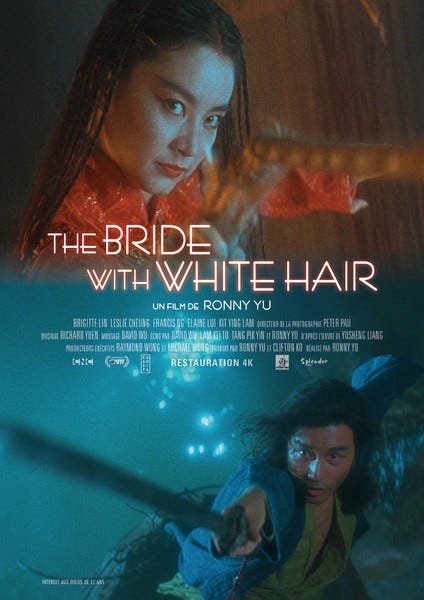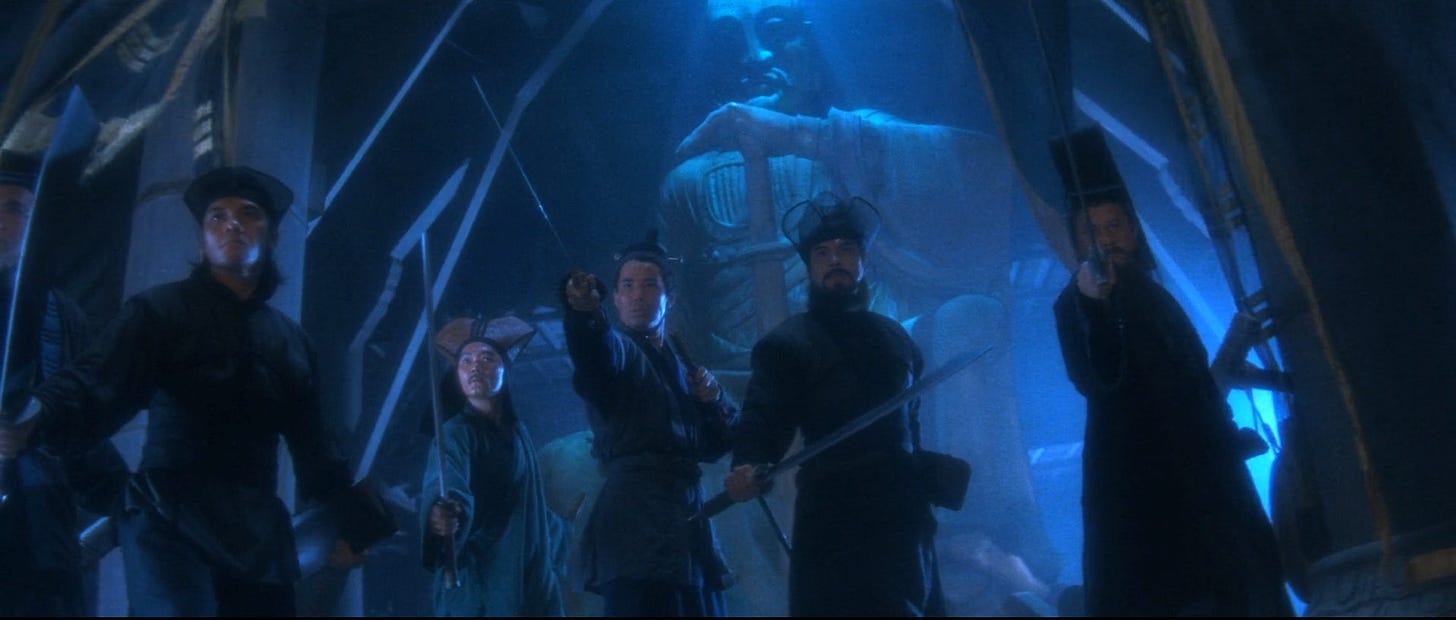The Bride with White Hair (1993)
“All it took was a single strike from me to defeat him. How is that ‘mercilessly killed?’”
After years of attacks on the Central Plains, True Taoist Purple Sun, Elder of the Wudang Sect and Chieftain of the eight great martial arts schools, has decided that the Demon Sect must be eliminated. He has chosen his successor, Cho Yat-Hang, to lead their armies. Yat-Hang, however, is deeply reluctant to take on the mantle of leadership. He also finds himself falling in love with Lien Ni-Chang, a girl who was raised by wolves but adopted by Gei Mou-Seung, leader of the Demon Clan, who trained her to become their strongest warrior.
If that sounds a little out of your wheelhouse, fret not. If EEAAO taught us anything, it’s that the inclusion of interdimensional travel, bagel singularities and hot dog fingers does not mean a movie is crap. Far from it. The Bride with the White Hair is one of those fantastic surprises that comes along now and then. While I expected over-the-top action sequences, I didn’t anticipate the movie would be as beautifully shot, as well acted, or as complex and nuanced as it was.
In my second viewing of the movie, I collected over 200 screenshots, and when I reviewed them, they were all gorgeous. Dark, mind you - the film is all night shots, poorly lit buildings, and caves - but undeniably beautiful. The costumes are stunning, and the sets are impressive, but cinematographer Peter Pau’s shots of the actors themselves are one thing that really sets this film apart. The main characters, Brigitte Lam (Wolf Girl/Lien Ni-Chang), Leslie Cheung (Cho Yat-Hang), Francis Ng and Elaine Lui (Gei Mou-Seung) are all simply gorgeous. Every second the camera lingers on the actors is a delight, and each of their faces is wonderfully adept at communicating an entire kaleidoscope of emotions and motivations. There is also an intriguing gender-twisting going on in the case of both couples. The feminine side of Leslie Cheung’s beauty is emphasized time and again, as are the strength and definition in Brigitte Lin’s features, and the fact that both are equally matched in terms of physical prowess gives a refreshing balance to their interactions. Francis Ng and Elaine Lui are more clearly defined along gender lines…but they’ve got their own thing going on…
The screenplay, written by David Wu, Ronny Yu and Kee-To Lam and based on a novel by Yusheng Liang, is a master class on efficient and entertaining character development. The young Cho Yat-Hang (delightfully played by female actor Leila Tong) is thoroughly irreverent, astonishingly skilled at martial arts, yet also deeply moral. When his teacher launches a surprise attack on him during training, he pops the grasshopper he’s been playing with into his mouth for safe keeping, and later (after commenting that sometimes he’d be a hero) Yat-Hang rescues a lamb from being slaughtered by a farmer. There’s a nice transition from the young Yat-Hang being criticized for the lamb rescue by his Martial Uncle White Cloud to the grown Yat-Hang being criticized for killing a chief constable by the same Uncle White Cloud. White Cloud argues that since Yat-Hang is chosen successor to the Wudang Chieftain, he should not engage in such wanton acts. The family of the slain constable, however, hilariously rushes to Yat-Hang’s defense. Later White Cloud berates him for beating up six of the other successors to the various martial sects, but Yat-Hang reveals that he meted out the punishments because they were committing all manner of crimes.
As humorous as these scenes are, they introduce and underscore a grey zone in the moral standing of the leadership of the Eight Sects. The ethical complexities involved are portrayed most vividly in the attack where the adult Yat-Hang and the Wolf Girl, Lien Ni-Chang, meet. Soldiers are sent to wipe out a group that is raiding military provisions. During the massacre, the Wolf Girl appears and starts fighting the soldiers. Yat-Hang then shows up and begins fighting with Wolf Girl. So far, so good, but it’s not nearly that simple, because during the battle we’re made aware that the people raiding the stores are desperately hungry. They’re peasants, not warriors. The soldiers are also slaughtering children. A man and his pregnant partner escape the battle only for the woman to go into labour. When Yat-Hang discovers them, he does what he can to help, but it’s only with the Wolf Girl’s help that they are able to deliver the child.
“Can’t you see Martial Brother’s got his hands
full with Martial Sister’s two snow white buns already?”
When the Eight Sects and the Demon Cult Temple both declare their intentions to annihilate one another, Yat-Hang and Ni-Chang find themselves in love and struggling to disengage from the hostilities. Both owe a deep debt of obligation to their clans, yet neither is willing to participate in wholesale slaughter. In his debate with his Chieftain, his drunken entrance to the strategy meeting, and his discussion with his friend General Wu San-Kuei (Eddy Ko), Yat-Hang finds himself repeatedly exhorted to take the mantle of command, yet he cannot blindly commit himself to duty.
This is Hamlet-level plot development, and it’s exquisitely portrayed by Leslie Cheung.
Not to fret, there’s everything you’ve come for. It’s a Chinese martial arts film so you’ve got giant leaps, impossible swordsmanship, blood spraying out under incredible pressure, and some truly awful depictions of lovemaking in much too much water. They haven’t left out the horror, either, let me tell you. It’s not called the Demon Cult for nothing, and the titular white-haired bride is a supernatural force to be reckoned with.
Ultimately, however, this is a tragic tale, very well told.
Listen to a discussion of The Bride with White Hair or the Castle of Horror podcast!









